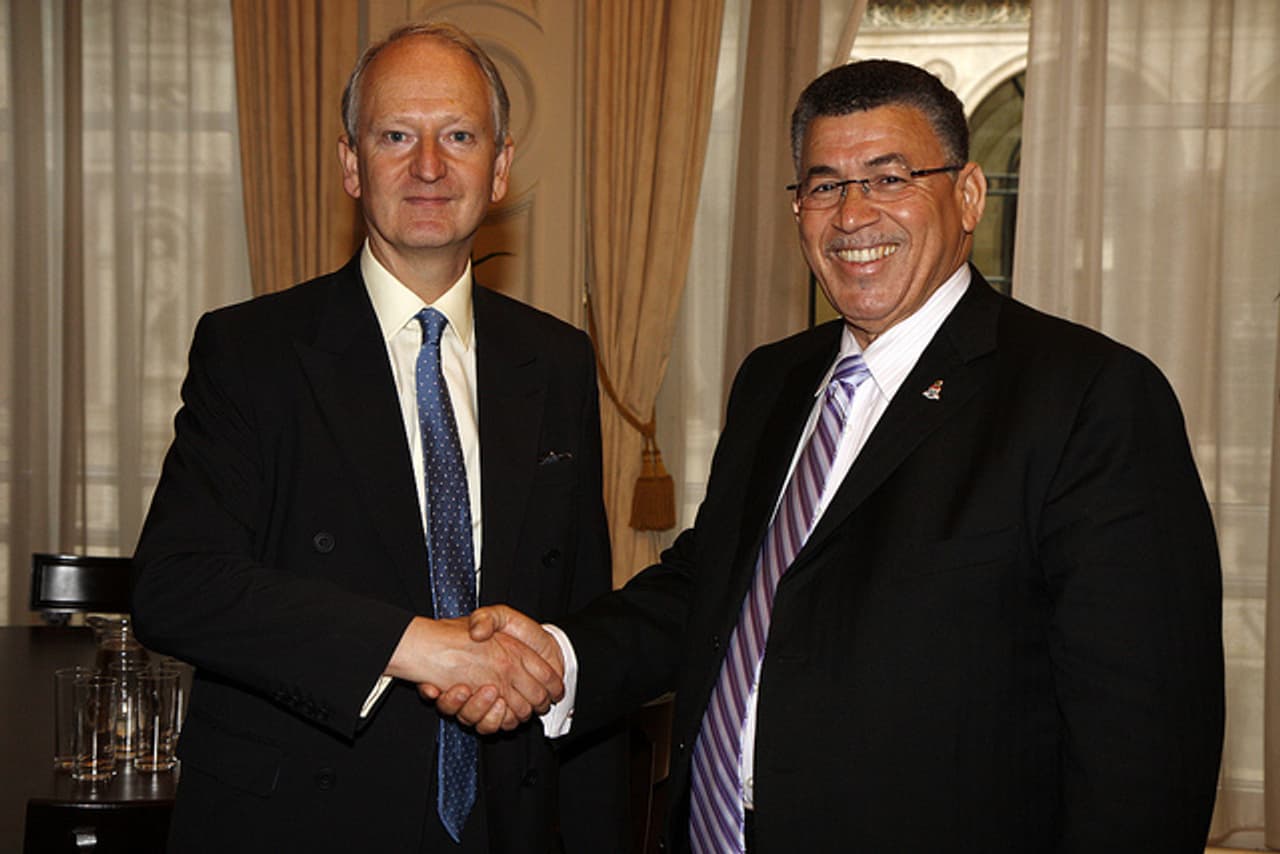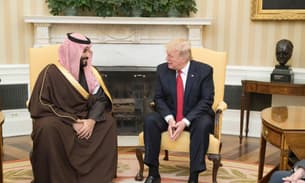
Foreign Office approved peer’s role as tax haven lobbyist
Foreign office minister Henry Bellingham meets McKeeva Bush, Premier of the Cayman Islands, in 2010
The Foreign and Commonwealth Office approved Lord Blencathra’s appointment as a paid lobbyist for the Cayman Islands government, despite his role potentially breaching parliament’s code of conduct.
Lord Blencathra was appointed director of the tax haven’s London office in November 2011 and his consultancy, Two Lions, is paid £14,000 per month for his services.
Following a Bureau investigation into Lord Blencathra’s lobbying activities he was referred to the Commissioner for Standards and is under investigation for a possible breach of the House of Lords Code of Conduct, which forbids peers from accepting payment for parliamentary services.
The FCO told the Bureau in April, following our investigation, that it had played ‘no role’ in the appointment.
However correspondence released under Freedom of Information shows the Minister for Overseas Territories, Henry Bellingham, approved Lord Bencathra taking the job despite looking at the potential for conflicts of interest arising from his role in the House of Lords.
As a member of the House of Lords, Lord Blencathra is entitled to vote on legislation affecting the jurisdiction.
Related article: Conservative peer hired as tax haven lobbyist
Lord Blencathra wrote to Mr Bellingham on November 10 2011 announcing that he would be representing the interests of the Cayman Islands government at a ‘strategic and political level’. The London office was expanding with the goal of promoting the Islands and their financial and tourist industries and improving their relationship with the UK government, he added.
His letter was written on paper headed ‘The Rt Hon the Lord Blencathra,’ suggesting he was writing in his capacity as a member of the House of Lords, though he apologised for this and said he would only be using the paper ‘for the next few days’.
He also emailed the FCO’s Overseas Territories Directorate asking to discuss the agenda and expected outcomes’ of a meeting between Mr Bellingham and Caymans Premier McKeeva Bush scheduled for a few days later.
The peer met officials from the directorate the next day.
FCO notes of the meeting state that the department was ‘considering the implications of a member of the House of Lords being appointed on contract to an Overseas Territories government (ie paid) to represent its interests.’
It added that there was also ‘a question of Party allegiance’ to consider. ‘The FCO had taken the view in the past that Ministers could not include MPs of their own party with no role in government in governmental meetings.’
At the meeting, Lord Blencathra reassured the FCO that he wished to avoid any perception of conflict and that he ‘had no interest in advancing his party’s politics through this job.’
On December 20 2011, Mr Bellingham wrote to the Premier of the Cayman Islands, McKeeva Bush, stating: ‘We have given provisional approval of this appointment.’
The FCO has withheld other correspondence relating to the peer on the grounds that it could prejudice relations between the UK and the Islands.
Lord Blencathra has admitted that his job involves lobbying and that he was appointed on the basis of his Westminster experience and connections to ‘get the message across’ to the UK government.
Guidance on the Code of Conduct for Members of the House of Lords says members may not accept payment in return for parliamentary services. This includes a ban on peers ‘making use of their position to arrange meetings with a view to any person lobbying Members of either House, ministers or officials.’
Lord Blencathra had attempted to arrange a meeting between an MP who had criticised the Islands as a tax haven and a delegate from Cayman, as well as lobbying Chancellor George Osborne to reduce air passenger transport duties on the Caymans.
Asked if his activities were compatible with the Code of Conduct, he told the Bureau in April: ‘You have confused lobbying parliament, which I do not do, with lobbying the government, which I do.’
Labour MP Paul Flynn referred the matter to the Commissioner for Standards, which has yet to announce its findings.
Any finding of misconduct would be hard to square with the FCO’s approval for the role however.
Since Lord Blencathra’s appointment relations between the Islands and the UK have deteriorated substantially as a result of British concerns over procurement practices and government spending.
However last week it was reported that Mr Bush is seeking UK help in lobbying against EU proposals to bring the Overseas Territories’ financial services regimes into line with EU legislation.
Lord Blencathra has been lobbying in Europe as well as in the UK. He has met Ashley Fox, MEP for the South West, to discuss ‘EU financial regulation and proposals for a financial transaction tax’.
More recently he has spoken at a conference as a representative of the Caymans on the controversial EU legislation known as AIFMD (the alternative investment fund managers directive), which will regulate hedge funds.




